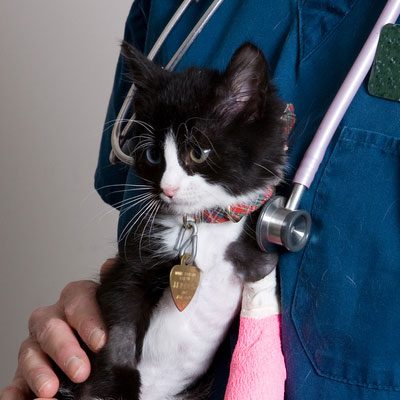After many years of dog ownership, you’ve just adopted Molly, a charming little tortoiseshell kitty you found through an animal rescue group. You intend to make little Molly the most pampered pet ever. Most importantly, you want to keep her healthy, so you’ve scheduled a new patient exam with your Chesapeake veterinarian. He’ll give you general cat care guidelines along with the inside scoop on some common feline medical problems.
The Terrible Trots
Molly doesn’t like diarrhea any more than you do, and she’s horrified at leaving this smelly mess. Molly could have gotten the trots from coughing up one too many hairballs or from eating food that sat in her bowl for several hours. Molly could have developed an allergy; or she might have contracted an infection, liver disease, or cancer.
Molly can easily become dehydrated if she loses enough fluids, so keep her bowl full of fresh water. Visit your vet quickly if Molly’s trots last for more than a day, if her output is dark or bloody, or if she has difficulty urinating. If Molly’s unusually lethargic or completely ignores her food, schedule a vet appointment right away.
Vile, Foul-Smelling Vomiting
As vomiting goes, cats seem to be the kings (and queens) of the animal world. Molly can vomit for many reasons, such as chewing and ingesting parts of her cat toys. Molly’s heaving and retching can also indicate an infection or other urinary tract condition, or she could be developing diabetes. Like diarrhea, frequent vomiting can cause Molly to upset her fluids balance and become dehydrated. Bundle Molly off to the vet so he can assess her condition and restore her fluids to normal.
All-Out Flea Assaults
You don’t want Molly to fall victim to voracious fleas that can make her life miserable. Once the little bloodsuckers attack Molly, she’ll begin scratching and licking, leading to irritation and skin redness. If Molly continues to work on herself, she can develop a secondary skin infection and unappealing bald spots. Molly can even become anemic. Good thing your vet can help you avoid this nightmare by placing Molly on a top-notch flea control and prevention program.
Diabolical FLUTD Diseases
Molly and her male feline friends can suffer from FLUTD, or feline lower urinary tract diseases. Molly’s telltale symptoms include urinating outside her litter box, bloody urine, painful-looking urination, or difficulty peeing at all. You don’t want Molly to reach a urinary crisis stage, so get her to the vet quickly.
Just like human medicine, Molly’s symptoms can have many causes, making it tough to identify her problem’s source. Fortunately, your Chesapeake vet can quickly diagnose Molly’s condition and provide treatment that gets her on the road to recovery.









